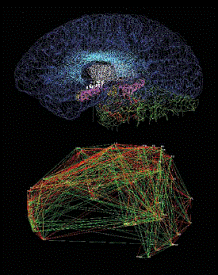2020 Science
by admin on June 26, 2006 11:00am
Every now and again, you read something that sticks in your head like tree sap.
Something that gets you thinking deeply about the future, your life and work… something that keeps you up at night with ‘monkey mind’, as the Zen folks like to say. 2020 Science did just that to me a couple weeks ago. 2020 Science is a look into the future, a “report that contains the initial findings and conclusions of a group of internationally distinguished scientists who met over an intense three days in July 2005 to debate and consider the role and future of science over the next 14 years towards 2020, and in particular the importance and impact of computing and computer science on science towards 2020.”
When I studied computer science I was fascinated by the Grand Challenges in science and mathematics, so this report fascinated me as it approaches many similar grand challenges and – specifically – looks into how computer science can help across these various disciplines.
The paper/roadmap looks across disciplines to understand how the various sciences interact and how they together can propel this 2020 science vision. I particularly enjoyed the coverage on multi-core cpu architectures, data ‘issues’ (association, aggregation, visualization, etc.) and I think the ‘computational thinking’ quote on page 12 (also here) by Professor Jeanette Wing, head of Computer Science at Carnegie Mellon University, is one of the most well articulated statements about effective problem solving that I’ve read.

A 3D model of the human brain
© 2005 Malcolm Young, University of Newcastle.
The second part looks into many disciplines and topics, global environment, molecular computing, software platforms and tools, the brain, bio-hybrid chips, genomic research, and communities. Far too much to cover in a blog entry – read this paper, it’s worth the time.
In my role, I often get asked to compare open source software to the software that Microsoft builds. There are many ways to answer as it’s not a simple question. However, on occasion I spend time with folks in Microsoft Research (MSR), and I’m also fortunate to meet many different leading thinkers in academia around the world. As a lifelong computer science ‘student’, I am always surprised at how easy it is for people to focus just on present tense and forget where we as a society want to go in the future, and what it takes to get there. When I read through 2020 Science, when I visit universities around the world, or when I wander across the 520 highway to visit friends in MSR, I’m reminded by the grand challenges that we are challenging on a daily basis. Some problems are hard, very hard and often require very specific skills and new ways of thinking to attempt to solve. Some problems require innovation, some require invention. Some challenges need today’s tools, some require new tools. There are problems that require certain models to solve: by itself, OSS is often not appropriate for some of these problems, nor, at times, is only commercial/proprietary development (read the ‘new communities’ section on page 24). Problem context is crucial to framing the approach. Even IBM’s Linux strategy ‘godfather’, Irving Wladawsky-Berger (Vice president, Technical Strategy and Innovation) commented recently on this community appeal issue as it relates to certain types of problems:
“Generally, proprietary software tends to be higher volume, higher levels of transactions, and higher levels of security, and vendors have very focused teams to do that. And the layers of software that I would associate more with Internet culture are the most likely candidates for open source communities. Remember, in a community, you have to want to work as a community. There are certain kinds of problems that appeal to people to do that, and there are others that don't.”
In addition to having spent my career in both OSS and commercial software environments, I see this ‘model context’ issue in my current work and every day I’m more convinced that choice and evolution of models (and formats, standards, tools, software, etc.) will be the path both science and industry travel on to reach the 2020 vision.
-Bill